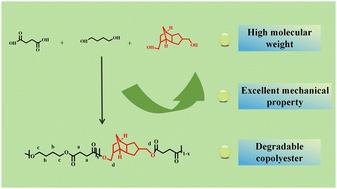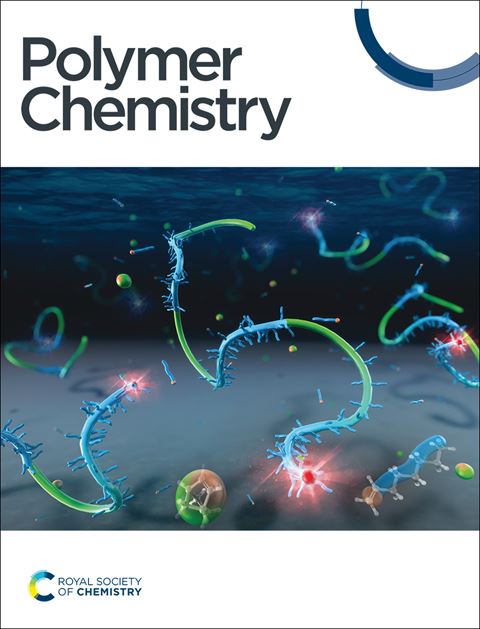通过共聚改性聚丁二酸丁二醇酯合成具有高分子量和优异机械性能的可降解聚酯
IF 3.9
2区 化学
Q2 POLYMER SCIENCE
引用次数: 0
摘要
保持可降解聚酯的高机械性能对其实际应用至关重要。在这项研究中,在聚丁二酸丁二醇酯(PBS)的合成过程中引入了具有刚性环结构的三环十二烷二甲醇(TCD),形成了 PBTCDS 共聚多酯。加入 TCD 后,共聚聚酯的玻璃化转变温度 (Tg)、机械性能和阻隔性能都得到了明显改善。PBS 固有的韧性因其断裂伸长率较低而受到限制,从而限制了其应用范围。然而,本研究合成的 PBTCDS5 拉伸强度为 42 兆帕,断裂伸长率为 687%。值得注意的是,PBTCDS15 的断裂伸长率达到了 860%,大大提高了 PBS 的机械性能。与 PBS(Tg -31.4°C)相比,共聚聚酯的 Tg 从 -29.2°C 提高到 -22.8°C,从而改善了其热性能。水蒸气阻隔测试表明,水蒸气透过率有所提高。此外,水降解实验表明,改变 TCD 的含量会导致不同的降解率,从而产生不同降解率的共聚聚酯。最终,这种方法在保持可降解性的同时,大大提高了机械性能,从而拓宽了 PBS 的应用范围。本文章由计算机程序翻译,如有差异,请以英文原文为准。

Synthesis of degradable polyester with high molecular weight and excellent mechanical properties through copolymerization modification of poly(butylene succinate)†
Maintaining the high mechanical properties of degradable polyesters is crucial for their practical application. In this work, tricyclodecanedimethanol (TCD) with a rigid ring structure was introduced into the synthesis of polybutylene succinate (PBS) to form PBTCDS copolyester. The addition of TCD significantly improved the glass transition temperature (Tg), mechanical properties, and barrier properties of the copolyester. The inherent toughness of PBS is limited by its poor elongation at break, which restricts its application range. However, the tensile strength of PBTCDS5 synthesized in this study is 42 MPa, with an elongation at break of 687%. It is noteworthy that the elongation at break of PBTCDS15 reaches 860%, greatly improving the mechanical properties of PBS. Compared with PBS (Tg −31.4 °C), the Tg of the copolyester increased from −29.2 °C to −22.8 °C, thereby improving its thermal properties. The water vapor barrier test showed that the water vapor transmission rate had improved. In addition, water degradation experiments showed that changing the TCD content resulted in different degradation rates, leading to copolyesters with different degradation rates. Ultimately, this method significantly improves mechanical properties while maintaining degradability, thereby broadening the application scope of PBS.
求助全文
通过发布文献求助,成功后即可免费获取论文全文。
去求助
来源期刊

Polymer Chemistry
POLYMER SCIENCE-
CiteScore
8.60
自引率
8.70%
发文量
535
审稿时长
1.7 months
期刊介绍:
Polymer Chemistry welcomes submissions in all areas of polymer science that have a strong focus on macromolecular chemistry. Manuscripts may cover a broad range of fields, yet no direct application focus is required.
 求助内容:
求助内容: 应助结果提醒方式:
应助结果提醒方式:


